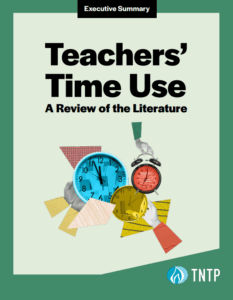This op-ed was originally published in the New York Daily News.
When the New York Board of Regents voted last month to eliminate a literacy test from its teacher certification requirements, many blasted the move as watering down education standards. After all, shouldn’t we ask aspiring teachers to clear more hurdles, not fewer, to ensure that they’re truly up to the job?
It’s not that simple, as my organization has learned training teachers across the country over the last two decades. Hurdles are great if they reveal the strongest teachers and screen out weaker ones.
Unfortunately, most certification requirements in New York and other states tell us next to nothing about whether someone will go on to be a good teacher. They’re not high standards so much as roadblocks keeping talented people out of the profession for no good reason — and making it harder for schools to give kids the great teachers they deserve.
[subscribe]
Consider New York’s Academic Literacy Skills Test. While it sounds like a perfectly reasonable prerequisite, there’s no evidence that it sheds any light on a person’s teaching ability. Every year, we work with promising teachers who fail this exam and similar ones across the country. If there’s a reason this test should exist, it has nothing to do with improving teacher quality in New York.
Even without the literacy test, prospective teachers in New York still have to pass three other tests, and complete a degree program that likely requires hundreds of hours and thousands of dollars in tuition. But none of it accurately predicts what matters most: how much teachers help their students to learn once they’re in the classroom full-time.
Meanwhile, all these hurdles come with unintended consequences: They screen out aspiring teachers with a diverse set of backgrounds and life experiences, or discourage them from considering teaching in the first place. For example, only 46% of Latino candidates and 41% of black candidates passed New York’s academic literacy test, compared to 64% of white candidates.
Enrollment in teacher preparation programs is overwhelmingly and disproportionately white and female. As a result, only 17% of teachers nationwide are nonwhite, compared to more than half of public school students. This disconnect has serious consequences for kids. Research has shown, for example, that students are more likely to be referred to gifted programs and less likely to be suspended by teachers of their own race.
Certification rules also exacerbate schools’ struggles to find enough teachers in subjects like math and science, despite being surrounded by people in their community with expertise and interest. For most people, quitting their job to pursue an education degree (which likely won’t make them a better teacher anyway) isn’t a viable option — so they can’t even consider a new career in the classroom.
And teachers who successfully navigate the maze of requirements in one state might have to start from scratch if they move, no matter how well they’ve performed in the past. In their new state, they’ll likely face a choice between spending time and money taking more meaningless tests and unhelpful courses, or giving up the job they love.
[related]
We can do better than a system that shuts out promising teacher candidates — and we can do it without sacrificing meaningful standards. New York and other states should tear down even more of the arbitrary walls keeping dedicated, talented people out of the teaching profession, while strengthening standards at the end of the certification process, when we can make more informed judgments about someone’s teaching skills.
I know this approach works because at TNTP, we’ve applied it in our training programs. We give candidates an opportunity to teach summer school under close supervision, with intensive training on core instructional skills. Then we use structured observations of their teaching to certify those who show promise, and screen out those who don’t.
Our teachers earn a permanent license only after they’ve built a track record of success after one or two years in the classroom.
We’ve found that these observations predict our teachers’ long-term success more accurately than tests or any other stand-ins for teaching ability. That’s no surprise, given all the research showing that the most reliable way to know whether someone will be an effective teacher is to actually watch them teach.
Tune out the complaints about dumbing down the teaching profession. By getting rid of the literacy test, the Regents took an important first step toward this smarter approach to certifying teachers — one that could make our pool of educators stronger and more diverse, and ultimately put more students on the path to success. They should keep going.








